Blog Post No. 34
27th May 2016
Copyright © Renata Taylor-Byrne 2016
Renata’s Coaching & Counselling blog: Barbara Sher on finding and following your dreams before it’s too late…
A rave review of “It’s only too late if you don’t start now: How to create your second life at any age”
Introduction
 In this blog I want to share with you some of the insights and useful ideas from Barbara Sher in this book on self-understanding and career development. I hope you find them of some use as you design or redesign your life. She did a lot of research into how we grow, and develop into completely unique human beings.
In this blog I want to share with you some of the insights and useful ideas from Barbara Sher in this book on self-understanding and career development. I hope you find them of some use as you design or redesign your life. She did a lot of research into how we grow, and develop into completely unique human beings.
The reason I am sharing with you what Barbara Sher has written is because she has carefully analysed how we can lose track of ourselves in the first half of our lives. She has created powerful exercises to help us get back in contact with ourselves, so that we can create the best life for us: not the life that others think we should have.
Some people think that after 40, their future looks “all downhill”
Barbara Sher agrees with the view that life changes as you get older, but not in a negative way. This is her view of life after 40:
“…You’re walking down a new street. As a matter of fact, this is one of life’s most significant turns. But the minute you step round that corner what you’re going to see will astonish you,” and she goes on to state:
“Your first life (before the age of 40 approximately) belongs to nature. Your second life belongs to you.”
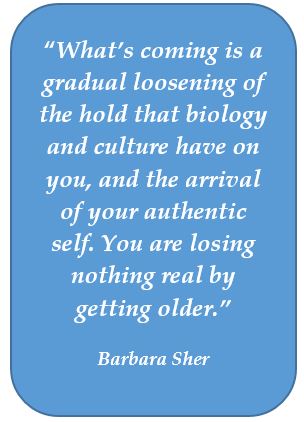 If you have reached midlife, you may feel that your possibilities are more restricted than when you were younger, and this view is encouraged by our surrounding society. Employers, despite government legislation, still see older people as less employable than younger candidates for the same job.
If you have reached midlife, you may feel that your possibilities are more restricted than when you were younger, and this view is encouraged by our surrounding society. Employers, despite government legislation, still see older people as less employable than younger candidates for the same job.
Following America’s example, many more people have plastic surgery now to visually hide their age, and growing older is seen in a more negative way than it used to be. Instead of there being a social recognition of the positive aspects of growing older (which could mean wiser!), in UK society today aging is treated negatively: there is always more news about the health problems people get as they grow older, and little about what they contribute.
Negative view of aging
Advancing years are increasingly seen as a descending path into illness, passivity, and disconnection from others. This view is a partial, inaccurate and very negative picture of what getting older means. It is also a self-fulfilling prophecy.
Discrimination against people because of their age is also growing: and older people are often squeezed out of the labour market just because of their age.
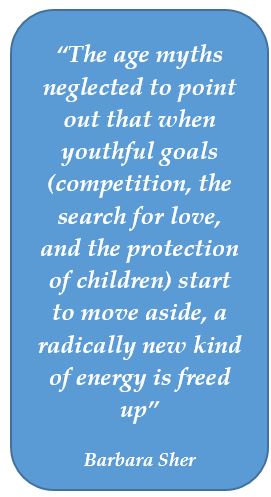 How does this affect us? We are like sponges, and all the messages we get from our culture, including the media, soak into us. Some of these messages need looking at carefully, because they are poisonous, and very bad for our physical and mental health.
How does this affect us? We are like sponges, and all the messages we get from our culture, including the media, soak into us. Some of these messages need looking at carefully, because they are poisonous, and very bad for our physical and mental health.
Example of prejudice about age
I’ll give you a concrete example: In the 1990’s I taught a Personal Effectiveness module for students who were on a college course which was preparing them for university the following year.
The student group were all mature candidates who were returning to education after raising their families.
I gave the students a simple exercise at the start of the module. It was taken from ‘The Brain Book’ by Peter Russell (1992). I drew a big graph on the whiteboard (as follows) and asked them to complete it.
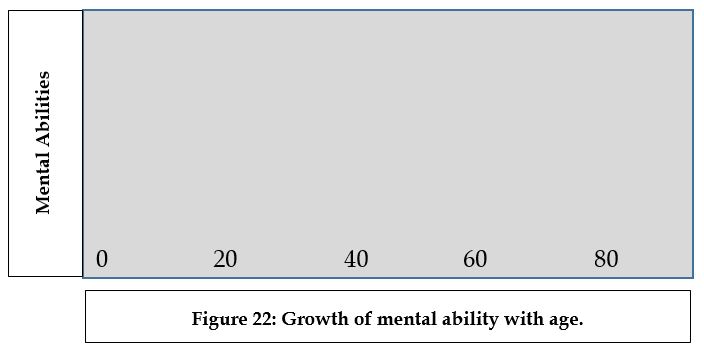 I asked the students to draw a line on the graph, showing how they thought mental ability developed– upwards or downwards (meaning improving or declining) – as we get older. I asked them to draw the line in felt tip from the left to the right hand side of the graph, indicating a rise or fall.
I asked the students to draw a line on the graph, showing how they thought mental ability developed– upwards or downwards (meaning improving or declining) – as we get older. I asked them to draw the line in felt tip from the left to the right hand side of the graph, indicating a rise or fall.
This graph was to represent their snapshot picture of how they thought our mental ability would develop as they grew older. One or two of the older students would groan, not knowing what the outcome of the exercise would be, but fearing in advance that their views on their reducing intellectual power, as they got older, would be confirmed.
EXERCISE: Why don’t you have a go and try out the exercise yourself?
Here is the graph again:

(By the way – DON’T scroll down this blog page or you’ll see the results of this quick quiz, and it will spoil the exercise for you).
Please copy this blank graph onto a piece of paper and then draw in a line which you think indicates what happens to our mental ability as we age. You might find that it helps to put in a series of crosses (‘x’s) and then join them up.
~~~
Here’s what my students invariably produced:
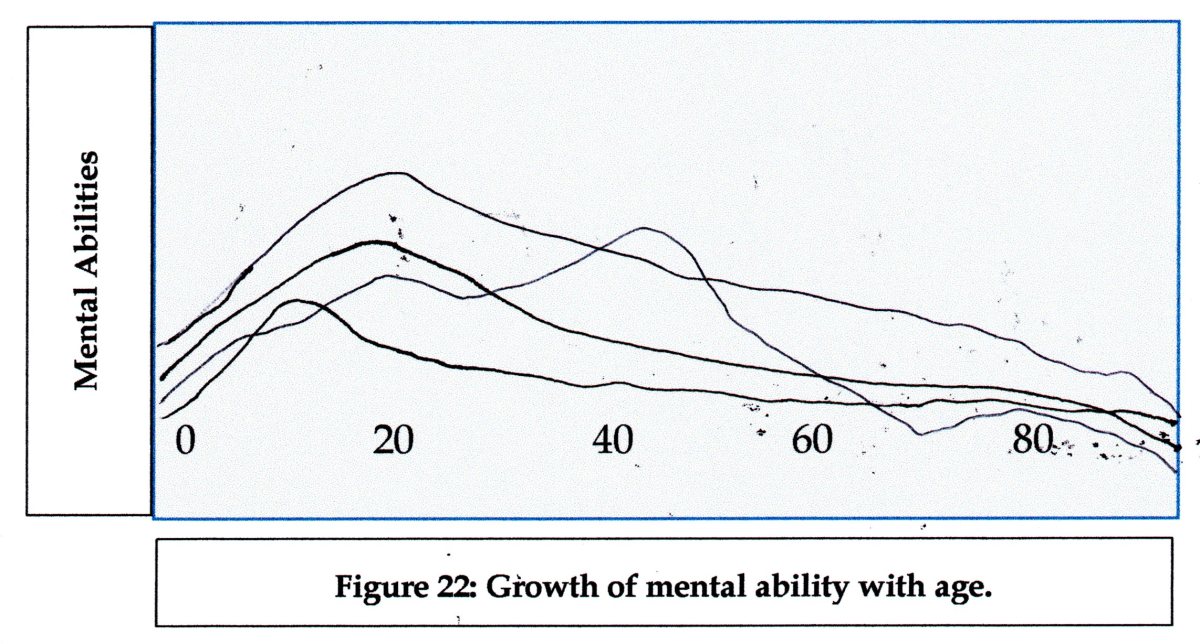
And here is the accurate picture of the graph, presented by Peter Russell (1992):
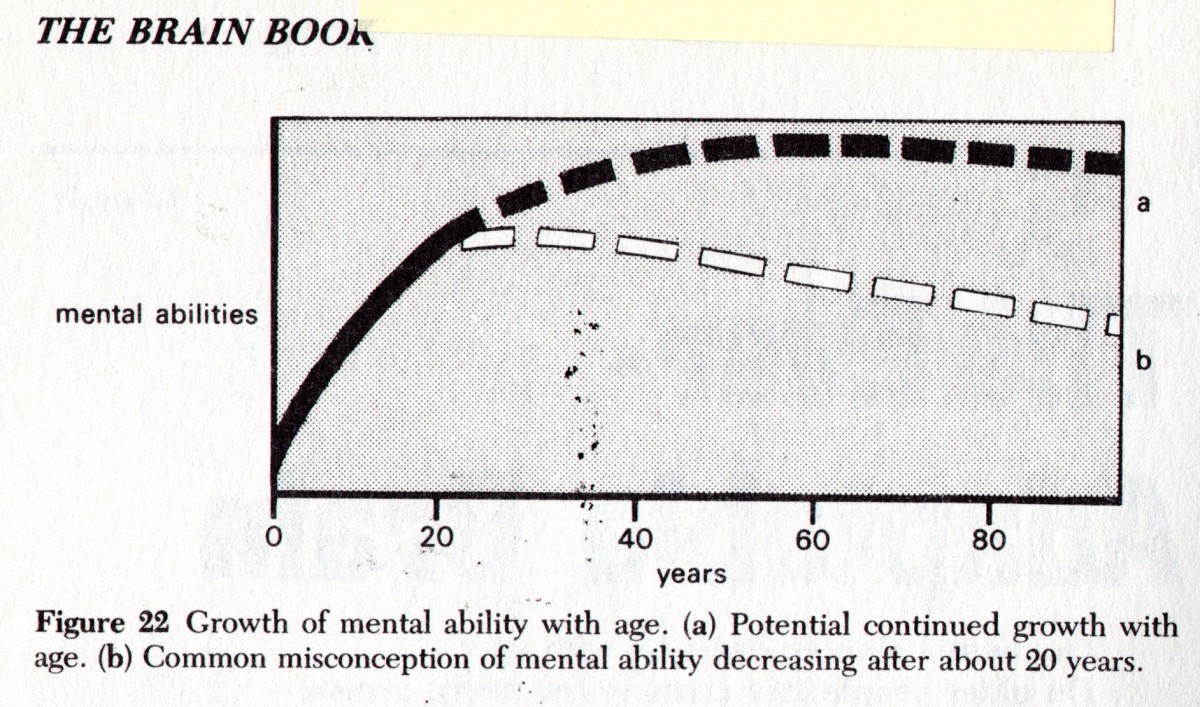
Line ‘a’ shows the extent to which our mind can develop as we get older, and the small (insignificant) decline after the age of eighty! Line ‘b’ shows the most common false ideas that many people hold about mental decline.
Review
Now have a look at what you drew as your guess for the way our mental potential develops and compare it with the graph above. My guess is that you will have exaggerated the degree of decline that is likely to occur in the average case.
Our beliefs are very powerful, and false negative beliefs can seriously harm us. This is why factual information which cuts through cultural myths can be very helpful.
My students were always convinced that their brains would be deteriorating once they went past 40 (at the latest! Most thought it was downhill after 30!)
Barbara Sher’s findings:
 Now to return to Barbara Sher’s key ideas: She considers that middle age is not a time for the start of decline. This is what she says:
Now to return to Barbara Sher’s key ideas: She considers that middle age is not a time for the start of decline. This is what she says:
“You’re not heading for any kind of decline. In fact you are about to embark on an amazing new beginning. The era you’re entering is so different from your first 40 years it’s completely justifiable to call it your second life.”
She has described what happens in our midlife as follows:
“What’s coming is a gradual loosening of the hold that biology and culture have on you, and the arrival of your authentic self. You are losing nothing real by getting older.”
“In fact you are moving into a life that’s sure to be more conscious, centred, creative and energetic than anything you’ve known so far.”
She considers that if we can give up our illusions of youth and immortality, and quit wishing that we could stop the clock, then we can move into our second life.
What to do?
How do we do that? She suggests the following:
 “…start paying attention to your dreams to see how you want to live. You begin to write the books that are in you, or go into the theatre and become an actor like you’ve always wanted, or you become an Arctic explorer, or a business owner, or you build a community you’ve always known was possible, or you head out to see the world you’ve always longed to see. In other words you start to live your life to suit who you really are.”
“…start paying attention to your dreams to see how you want to live. You begin to write the books that are in you, or go into the theatre and become an actor like you’ve always wanted, or you become an Arctic explorer, or a business owner, or you build a community you’ve always known was possible, or you head out to see the world you’ve always longed to see. In other words you start to live your life to suit who you really are.”
She explains that if you do this you reconnect with the self that you have had since childhood, before you hit adolescence:
“It’s who you were, before puberty changed you forever and threw up a mountain range of aches and urgencies, so high that you lost the sight of the original creature that you were.”
“…and this time, when that side of you returns, you’ll have the know-how and independence that you never had as a child…”
 She considers that when we were young, in order to survive and fit in, we gave away a lot of our personal rights, because… ”You were struggling for love and status and you thought you had to…”
She considers that when we were young, in order to survive and fit in, we gave away a lot of our personal rights, because… ”You were struggling for love and status and you thought you had to…”
She explains the rewards of finding out your true self:
“If you refuse to fritter away your future, trying to regain your past, you’ll see something amazing start to happen. You’ll find yourself looking forward to getting up every morning because it’s life you love, not a person you had a crush on.”
Learning through practical exercises
In this book she has a selection of powerful exercises which I strongly recommend that you do as a way of learning about yourself, and the lifestyle or career that could be right for you.
How we view getting older is very important, because it will affect us physically, mentally and emotionally, and the beauty of Barbara Sher’s book is that she helps you understand the journey that we are all on, and clearly shows that the best is yet to come – if we work on it. To get the benefit, we need to do the exercises and experiment with loosening up the false and fixed views of reality and ageing which our culture bombards us with all the time.
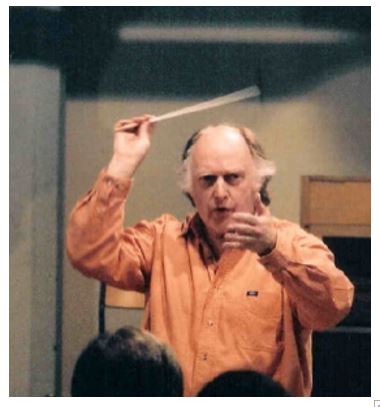 Conclusion
Conclusion
In my opinion this book is a real gem – a gift to the world! I hope I have managed to give you a brief flavour of the practical wisdom which is in the book, and I strongly recommend the exercises.
What about the readers of this blog who, like myself, are in their sixties, or seventies or eighties or nineties? I want to remind you of the title of the book: “It’s only too late if you don’t start now!”
Can that be true? Remember the author of The Camomile Lawn (Mary Wesley?). She wrote several great novels. But she didn’t even begin to write until she was 88 years old! Don’t give up!
Finally, here is a great quote from Henry Miller which Barbara Sher presents at the start of chapter 1:
“It was only in my forties that I started feeling young”
That’s all for now.
Best wishes,
Renata
Renata Taylor-Byrne
Coach-Counsellor-Tutor
The Coaching/Counselling Division
Renata4coaching@btinternet.com
01422 843629
~~~
Reference:
Peter Russell (1992) “The Brain Book,” London, Routledge
Barbara Sher (1998) “It’s Only Too late If You Don’t Start Now”, Delacourte Press, New York
~~~
